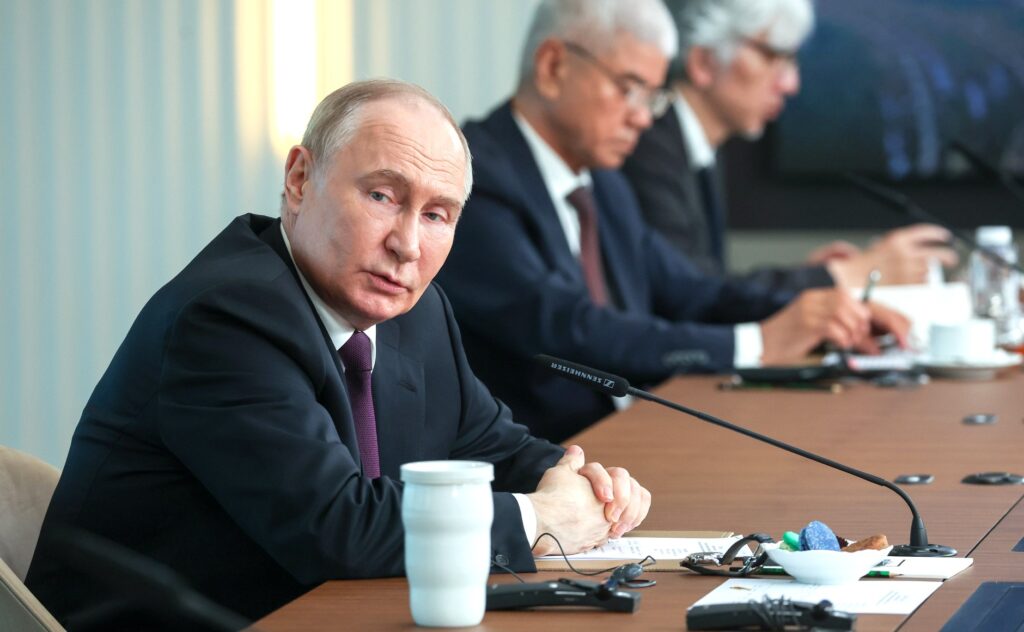Bunyamin Tekin
Russian President Vladimir Putin held a rare bilateral meeting with Turkish Foreign Minister Hakan Fidan in Moscow on Tuesday.
The meeting was Putin’s first with Fidan since he took office and came just a week after Putin criticized Turkey’s deepening economic ties with Western financial institutions.
“Turkey has been focusing on receiving loans, investments and subsidies from Western financial institutions. This is probably not a bad thing,” Putin said at a press conference on June 5, according to Turkey’s state news agency Anadolu. “But if this is related to restricting trade and economic ties with Russia, then the Turkish economy has more to lose than to gain. I think there is such a threat.”
While Fidan was meeting with Russian officials, World Bank President Ajay Banga was in Ankara meeting with Turkish President Recep Tayyip Erdogan and Finance Minister Mehmet Simsek to discuss Turkey’s Country Cooperation Framework Program, which recently doubled lending to Turkey to $35 billion.
Amid Western scrutiny and accusations that Russia is using Turkey to evade international sanctions over the Ukraine war, the U.S. Treasury Department has imposed sanctions on dozens of Turkey-based companies since the conflict began. But U.S. Ambassador to Turkey Jeff Flake said the U.S. is “doing better” by working with Turkish authorities to crack down on these activities.
Turkey imports more than 44 percent of its natural gas from Russia, but imports are falling due to pressure from the West. Russian exports to Turkey totaled $15 billion in the first four months of the year, down $2 billion from the same period last year, according to data from the Turkish Statistical Institute (TurkStat).
Putin acknowledged that the decline was due to price adjustments of major import and export goods, and said he “hopes we will be able to improve the situation in the near future.”
Turkey continues to balance between its NATO allies and Moscow, not joining Western sanctions against Russia while blocking Russian warships’ access to strategic waterways and supplying Ukraine with ammunition and drones.
Putin criticized Kiev for using Turkish drones to attack an undersea pipeline in the Black Sea that supplies gas to Turkey. “Ukraine is trying to attack the pipeline that brings gas to Turkey. This is not a joke or an exaggeration,” Putin said. “I ask you to convey the facts on this matter to our friend President Erdogan.”
Earlier this year, Turkish officials said Putin would visit Turkey in February, but the visit never materialized. On Tuesday, Putin hinted at plans to meet in person with Erdogan in Kazakhstan’s capital, Astana, on the sidelines of an international event on July 3-4.
Russia expert Kerim Has highlighted the unusual nature of Putin’s meeting with Fidan, noting that it is rare for Putin to meet with his foreign minister, suggesting there are serious underlying issues. Has suggested that economic tensions, particularly linked to Turkey’s growing reliance on economic ties with the West, are a key factor in the tense relationship.
“We are very concerned that the high-tech weapons supplied to Ukraine have the capacity to strike deep into Russian territory, and have positioned this as a major threat of asymmetric warfare,” Hass told the Turkish news program “Turkish Minute.” He also criticized Turkey for not opposing NATO’s growing presence in the Black Sea and for its military cooperation with Ukraine, highlighting the contradictory position Turkey finds itself in.
Has also addressed the economic aspects of Turkish-Russian relations. He noted that Putin’s explanation for the decline in trade being blamed on price adjustments is misleading. Instead, Has suggested that the decline in trade is due to various issues arising from Turkey’s partial compliance with Western sanctions against Russia, despite the absence of a formal policy. This compliance, Has said, is causing disruptions in bilateral trade.
Energy dependence remains a key factor in Turkish-Russian relations. Turkey is heavily dependent on Russian natural gas, and Putin’s strategic delay in his visit to Turkey shows that unresolved issues run deep. Unpaid debts and the stalled natural gas hub project indicate major economic frictions, Hass stresses. The tensions are further exacerbated by Turkey’s unwillingness to control the price of Russian natural gas that Russia sells to Europe. This stance reflects Russia’s strengthened position over the past few years regarding the war in Ukraine.
He also touched on the broader geopolitical implications of Turkey’s actions. Turkey’s economic woes have forced it to lean closer to the West, and Russia feels that its investments in Turkey aimed at circumventing Western sanctions are at risk. The shift has increased pressure on Turkey from both the West and Russia, forcing Ankara to walk a delicate tightrope. The reduction in direct contact between Putin and Erdogan and strained communication between the two are indicators of the growing instability in the relationship.
Love it? Support Turkish Minute on Patreon!



